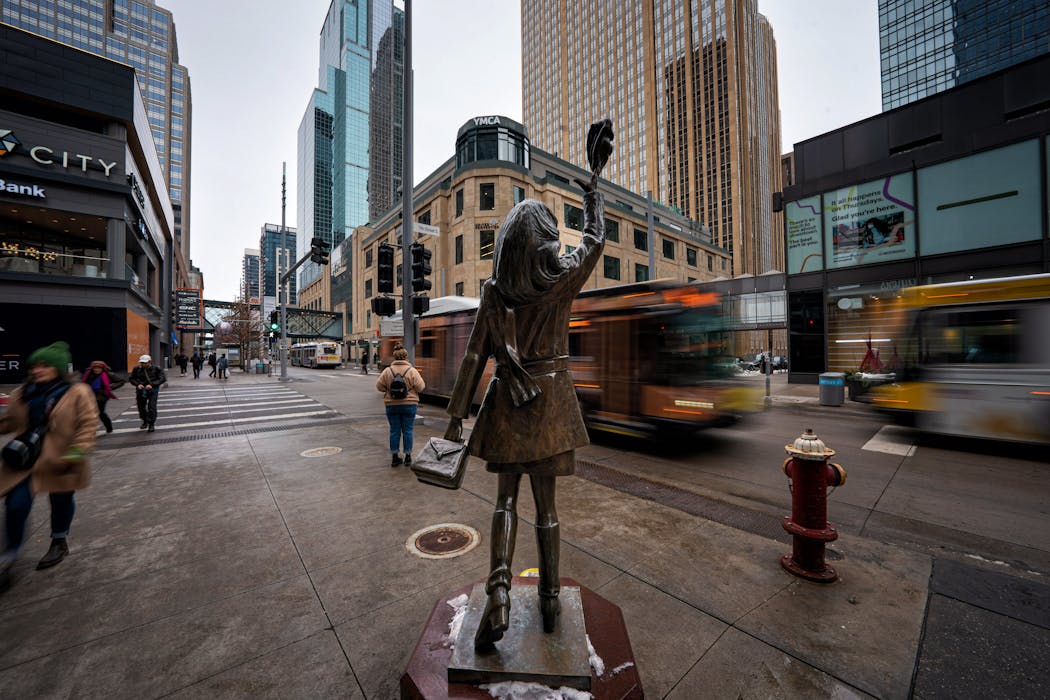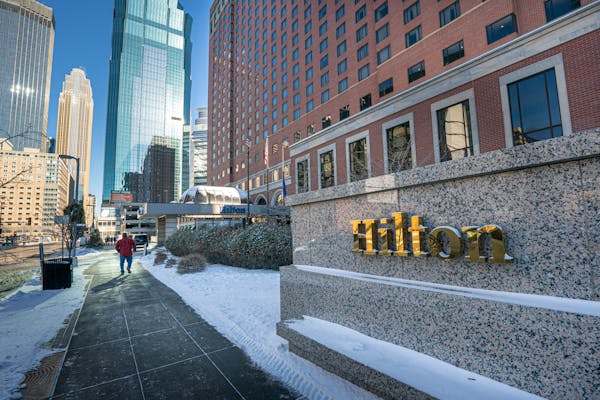At the corner made famous by Mary Tyler Moore, downtown Minneapolis is slowly losing its retailers.
And just a few blocks away, one of downtown's largest employers is planning to cut its office space in half.
The latest store to announce its departure from downtown is Marshalls, a discount haven for nearly 30 years in the basement of City Center on Nicollet Mall. Just last month, Nordstrom Rack closed its store diagonally across Nicollet and 7th Street, the intersection made famous in the opening credits of TV's "The Mary Tyler Moore Show" from the 1970s.
Separately on Friday, Ameriprise Financial confirmed that it will exit the 29-story skyscraper that has been its headquarters and consolidate its 4,600 office workers in another building it owns nearby. Many of those workers now spend three days a week at the office, working remotely the rest of the time.
"This is an inevitable time of transition that got expedited by COVID-19," Mayor Jacob Frey said Friday.
Next week, Frey is scheduled to announce details about a "vibrant downtown storefront work group" of business and city leaders to address challenges.
The large department store model is a dying retail configuration, he said. He would like to see smaller, possibly locally owned retailers on Nicollet Mall. He also is interested to see retailers focused on experiences and is open to more service-oriented businesses such as dog day cares.
"I've got an appetite for transition right now," Frey said. "I'm not going to be a picky eater when it comes to change."
He pointed to the former Macy's store, which closed years ago and was transformed into the office and retail Dayton's Project. Its Winter Makers Market, now in its second year, has more than 60 vendors, including Red Wing Shoes and Faribault Woolen Mills.
The Marshalls is expected to close Jan. 14.
"We are always assessing and reviewing our real estate strategies, and our decision to close this store reflects that thinking," said TJX Cos., the department store corporation that owns Marshalls, T.J. Maxx and HomeGoods.
The Marshalls and Nordstrom Rack closures are depressing blows to downtown even as vacant retail space in the Twin Cities has been steadily filling up in response to more people shopping brick-and-mortar sites. During the first half of 2022, the average retail vacancy rate for spaces in the metro area was a little over 10%, according to the commercial real estate services firm Cushman & Wakefield. But in downtown Minneapolis, it was nearly 35%.
While there has been a return of major events, downtown Minneapolis still isn't back to pre-pandemic foot traffic levels.
As of the beginning of this month, the Minneapolis Downtown Council reported that downtown restaurants had 64% of the seated diners they had compared with pre-pandemic times. Building occupancy of some of downtown's largest buildings is at nearly 62%, the council reported.
Even with more companies enforcing hybrid work models in which employees go to the office at least for a part of the week, the drop in downtown workers continues to hurt retail, said Carlos Castelán, managing director of local retail consulting firm the Navio Group.
"With many people working from home, or even just heading into the office a few days a week, the foot traffic that retailers banked on for those stores has decreased significantly and changed the profitability equation for the stores," he said.
Minneapolis-based Target Corp., downtown's largest employer, was the first major player to downsize its office space during the pandemic. It has cut its downtown office footprint by a third, exiting its offices in the City Center as more employees worked from home.
Ameriprise said it employees will move in phases over the next three years out of Ameriprise Financial Center at 707 S. 2nd Av. The company, which moved into the building in 2000, said its lease there expires in 2025.
It will relocate those workers to its client service center, a building it owns a couple of blocks away at 901 S. 3rd Av. Ameriprise has been renovating that space, adding skyway access and other amenities, such as a refurbished cafeteria and fitness center. The building will be renamed Ameriprise Financial Center Headquarters.
"We are pleased to bring all of our Minneapolis employees into one contemporary building and energizing environment as we work together to deliver an excellent experience for our clients," Ameriprise said in a statement. "While still in the early stages, this begins an exciting new chapter in our longstanding presence in Minneapolis."
Jonathan Weinhagen, president of the Minneapolis Regional Chamber, said he expects to see more changes as office leases come up in the next three to five years.
"We have to embrace the future," he said. "We have to embrace the flexibility. If you're a company that's not looking at the future of the way people work, you're doing it wrong."
Weinhagen added that he's glad that Ameriprise is "doubling down on downtown."
"I think it's a net positive anytime we have a longtime downtown tenant who says, 'We want to stay here,'" he said.
The Marshalls store downtown opened in May 1995 in the basement of the City Center complex. Because of its location in the business district, Marshalls carried a bigger assortment of career clothes than it did in its suburban stores.
In downtown, Marshalls has been one of only a few remaining options for clothing shoppers. After decades of being home to bustling department stores such as Dayton's (which closed as a Macy's in 2017) and boutiques, major retail on Nicollet Mall has slowly disappeared.
A Marshalls that sells more formal work clothing that shoppers can find at other stores likely wasn't unique enough to draw people into downtown on its own, said Toopan Bagchi, founder and managing director of Twin Cities retail consultancy Starship Advisors.
"The only reason to [shop there] would be because I'm in an office for a set period of time over lunch ... but if I'm not there, there isn't a compelling reason for me to go," he said.

Minnesota Department of Health rescinds health worker layoffs

Eco-friendly house on 30 acres near Marine on St. Croix listed at $1.6M

DOGE cuts federal money for upgrades at Velveeta plant in New Ulm




